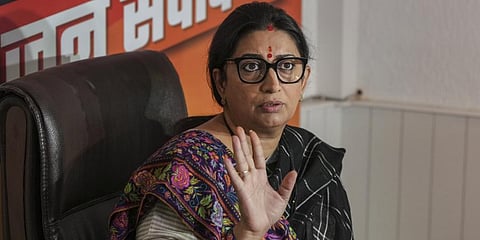

BHOPAL: While terming the killing of 16 people in poll violence during Saturday’s three-tier panchayat polls in West Bengal as 'Maut ka Khela', union minister Smriti Zubin Irani targeted both the Mamta Banerjee-led TMC as well as the Congress over the killings.
“All I can say is that people are seeing the murder of democracy taking place in West Bengal during the panchayat polls. People were killed because they wanted to vote. Now, the Gandhi family is determined to align with the same TMC.”
“I have a special question for the Gandhi family; is it still willing to align with those who are wreaking havoc in West Bengal? People are getting killed because they want to vote, why is this Maut Ka Khela acceptable to Rahul Gandhi?” Irani questioned while talking to journalists in Bhopal on Sunday.
At least 16 people were reportedly killed in violence in different districts during the panchayat polls in West Bengal on Saturday.
Earlier, addressing a regional symposium in the MP capital on child protection, safety, welfare and rights, the union minister informed that the central government has dedicated Rs 74 crore for the care, well-being, education and skill development of rape and other sexual offence victims (who are aged below 18 years) under the Protection of Children from Sexual Offences (POCSO) Act. “Rs 4,000 monthly sum will be given to such girls and if they are housed in child care institutions, special efforts will be made for the education and skill development too,” Irani informed.
Requesting the child welfare committees (CWCs) to prepare a list of older age children (those aged above six years) housed in childcare institutions, the minister said these lists will enable the government and other stakeholders to work for getting these older age kids adopted by families.
“We’ve already initiated this work in two states, out of the 9000 cases evaluated, special attention was paid to 3000 children, out of which, cases of 160 have already been presented for adoption by families in just two-three weeks. While families are eager to adopt kids up to 6 years living in children care homes, there are hardly any takers for the older age group kids. We want to ensure that those kids, many of whom haven’t seen anyone visiting them for 2-3 years, don't have to live in children's homes till attaining 18 years of age, but are actually adopted by families.”
The minister also asked CWCs to identify such children in institutional care, who can be reunited with their families. “The sustained attempts by the National Commission for Protection of Child Rights, State Commissions for Protection of Child Rights and CWCs has enabled reunification of 1.45 lakh such children with their families in the last few years nationally.
While maintaining that building offices of CWCs was the responsibility of the central government, Irani sought proposals from all office-less CWCs in this regard, so that the process of giving them proper offices can be expedited.
“The government particularly wants to create proper child care and protection infrastructure in those areas (including border areas) which are most vulnerable to child trafficking. In the last nine years, 3.92 lakh missing, abducted and trafficked children have been reunited with their families across the country due to the efforts of all stakeholders,” she said while addressing a regional symposium on child protection, safety, welfare and rights held under the Vatsal Bharat in Bhopal on Sunday.
Representatives of child welfare committees (CWCs), Juvenile Justice Boards (JJBs), Village Children Protection Units (VCPUs) and Anganwadi workers from MP, Chhattisgarh and Rajasthan attended the symposium.
Childline handed over to states
The union minister also informed on Sunday, about the decision to hand over Childline to states, to ensure that distress calls by children in trouble get connected directly to local police and administration, followed by quick response on the issues.
Childline 1098 is a 24-hour-a-day emergency helpline service for children in need of aid and assistance. The nearly 26-year-old Childline is partnered with civil society and the government.